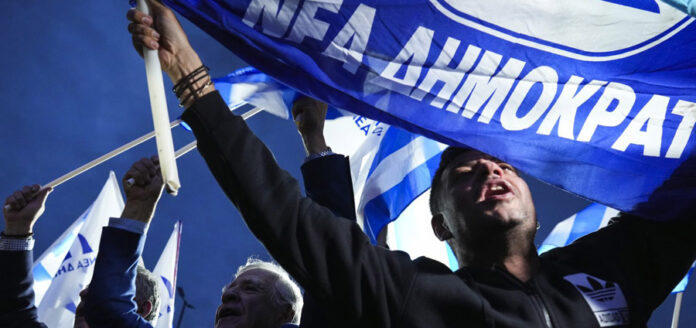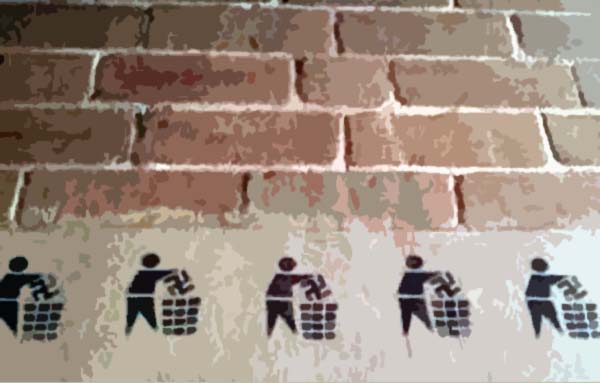Eleni Mitsou
This is an edited translation of a “Xekinima” article, initially published on May 22 in Greek (read here). For the background to this election result, you can read our pre-election analysis here, our position for the election here and our contribution for the discussions inside the Left here. You can also find more info at our live updates article here.
The results of the May 21 election naturally caused disappointment to the people in struggle and to the mass movement. New Democracy (ND) won, managing to hold its forces (with a slight increase of 0.9%) despite dozens of scandals, attacks, acute repression, the train crime at Tempi, ect.
More important, however, is the large margin between the ND vote and all the other parties, with a 20% lead over SYRIZA. It is the largest margin between the two main parties since 1974, when ND was 35 percentage points ahead of the “Centre Union” (the center party at the time). This huge margin will allow the new government to intensify its attacks on the working class and the youth.

Collapse of SYRIZA
SYRIZA came down with a huge crash. It lost 11.5 percentage points and almost 600,000 votes compared to the 2019 elections, following the same course as most of the former “new left formations” and Social Democratic parties in Europe that turned to the right and became integrated into the system.
In the past four years SYRIZA did not engage in any kind of substantial opposition. It did not focus on any of the problems of concern to the working and popular classes, such as the collapse of the National Health System, incomes, workers’ rights, etc.
Actually, it would be surprising if it did, since it had no intention of pursuing a fundamentally different policy from New Democracy’s in these fields. SYRIZA bet on the “natural” loses of ND and the “cockfights” in TV shows. The result was that it could not attract even a sufficient protest vote –of the “lesser evil” kind– and lost voters in all directions. As a result, a significant part of SYRIZA voters returned to PASOK (the traditional Social Democratic party) which had a 3.5% increase and came second in 6 constituencies.
Defeat for the Left and the movements
This election result is a defeat for the Left as a whole – of course not including SYRIZA in the Left. The 1.9% rise of the Communist Party of Greece (KKE) does not, unfortunately, change the overall picture.
With 7.2%, KKE has returned to the percentages it was getting before the crisis of 2008-9-10. It is still short, however, of the 8.4% result and the approximately 600,000 votes of the 2012 elections.
The rise of KKE is largely due to the fact that it managed to attract part of the left-wing protest vote. But a lot of these voters are deeply critical of KKE’s policies. KKE scored better largely due to the dramatic situation of the rest of the Left and the lack of a credible alternative. Simply put, many people voted for KKE because they had nothing else to vote for, not because they are inspired by its political vision, or because they believe that it can lead the workers’ movement to substantial victories.
The rise of KKE could have made the mass movement optimistic about the future, if it was combined with a united front approach towards the rest of the Left and the movements – but it is not.
For, such a change could indeed lead to victorious struggles, as was the case with the E-food delivery workers and others, where KKE acted in cooperation with other forces of the Left. But these cases were unfortunately the exception and not the rule. It is more likely that the rise in KKE’s votes and the fact that it is now the only Left party in parliament will fuel its arrogance and aggressive attitude towards other forces of the Left and the movements.
ANTARSYA
ANTARSYA (the anticapitalist alliance between NAR, an older KKE split, the Greek SWP and a number of other smaller forces) did not manage to score more than 0.5% (31,000 votes) and this, unfortunately, was something that was expected. Its vote is even lower from the results it got in the relatively recent past – e.g., in September 2015 it got 0.85% and 46,000 votes.
The shrinking of ANTARSYA’s political influence has been more than evident in the past few years. The main responsibility for this, however, lies with its own leadership. Among other things, in its obsessive refusal to cooperate with parts of the Left that it has differences with.
MERA25
MERA25 (Varoufakis’ DiEM25 in Greece), instead of increasing its percentages lost about 40,000 votes and was left out of Parliament, as it didn’t reach the 3% threshold. It scored even lower than the Freedom Course Party (the party of the former President of Parliament under SYRIZA, Zoi Konstantopoulou), which appeared “out of nowhere” to fall a little short of getting 3%.
The left turn of MERA25 at its last congress had created expectations in sections of the Left. However, both the substance of its programme and the concepts it used to describe it, remained blurred for the popular layers. Concepts such as “post-capitalism” were sometimes identified with socialism and sometimes with Green Keynesian policies, while “techno-feudalism” as a description of the current phase of capitalism could only cause confusion.
More importantly, however, MERA25 did not stop, until the last moment, to have its feet in two boats regarding the issue of a possible coalition government with SYRIZA. Speaking to left audiences, MERA25 made assurances that it would not go ahead with a coalition with SYRIZA. But speaking to SYRIZA voters, it emphasized that MERA25 wanted a coalition but the SYRIZA leadership did not respond. Varoufakis did not abandon this position even in his statement on the evening of the election results, when he said that the responsibility for Mitsotakis’ victory lies with Tsipras, who did not respond for two years to the calls made by MERA25 for programmatic discussion and cooperation.
The far right
ND before the elections used the ruling of the court against Golden Dawn describing it as a “criminal organisation” to pass a law which prohibited a number of far right parties to stand. This was ratified by the Supreme Court and thus Golden Dawn and a number of its splits could not file ballot papers. This enabled ND to limit the loss of votes to the right. But it did of course wipe the far-right from the map.
The small but significant rise of “Greek Solution”, which got 4,5% and the appearance, out of the blue, of another far-right party, “Victory” (“Niki”), which failed to enter parliament for a few votes, shows that the far-right presence in the central political scene is here to stay.
New political formations will constantly be born to represent this space, as long as the root causes that turn people to xenophobia and nationalism remain. Depending on the period and the resistance of the anti-fascist movement, these parties may have more moderate characteristics, as they do today; but it is entirely possible that in the future we will be confronted again with more violent neo-Nazi gangs in the streets, on a much bigger scale than today. As long as broad sections of Greek society are mired in poverty and oppression, the far right and neo-fascism will find room to grow; that is why the anti-fascist struggle must continue.
Looking ahead
The Left and the movements still operate in the environment of the defeat caused by the capitulation of SYRIZA in 2015. Although important steps are being taken in certain areas and fields of resistance, although the movement is beginning to appear stronger in the streets, it lacks the political organisation and representation that will enable it to fight back and score victories.
The forces fighting for the overthrow of capitalism and for the building of a socialist society under conditions of workers’ democracy, which are quite substantial in Greece, have a duty to work together with the aim to lay the foundations for a new mass party of workers and youth.
In our opinion, the organisations of the anti-capitalist Left which have an orientation to the mass movements and the working class and understand the importance of the United Front approach, need to move in the direction of a common political formation based on:
- a clear anticapitalist/socialist program,
- intervening in every struggle fighting for the daily needs and demands of the labouring masses, alongside the general anti-capitalist struggle,
- collaboration on the basis of parity between the different organisations, with respect and proper representation for the non-aligned militants,
- a united front approach towards other parts of the Left; for joint actions, joint initiatives in movements, demonstrations, etc, despite the ideological differences that may exist.
In our opinion, the conditions for such an initiative are ripe among a number of organisations – those that during the present election campaign did not identify themselves with a particular electoral formation of the Left but adopted the position of voting for the Left parties without expressing any preference vote for any of them. At the same time, of course, such an initiative should be open to any other force that wants to participate and contribute.













